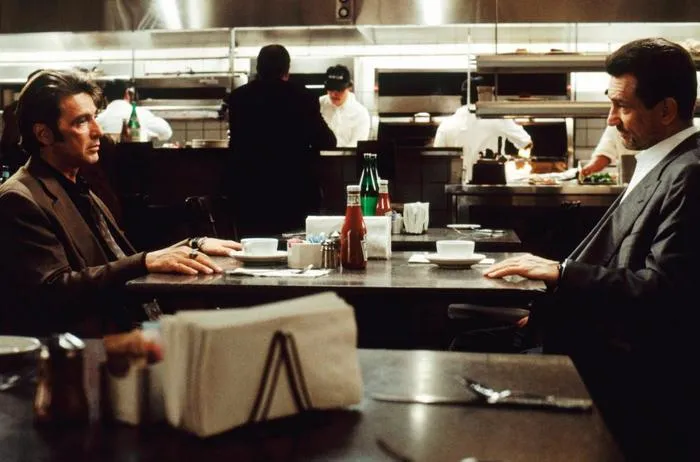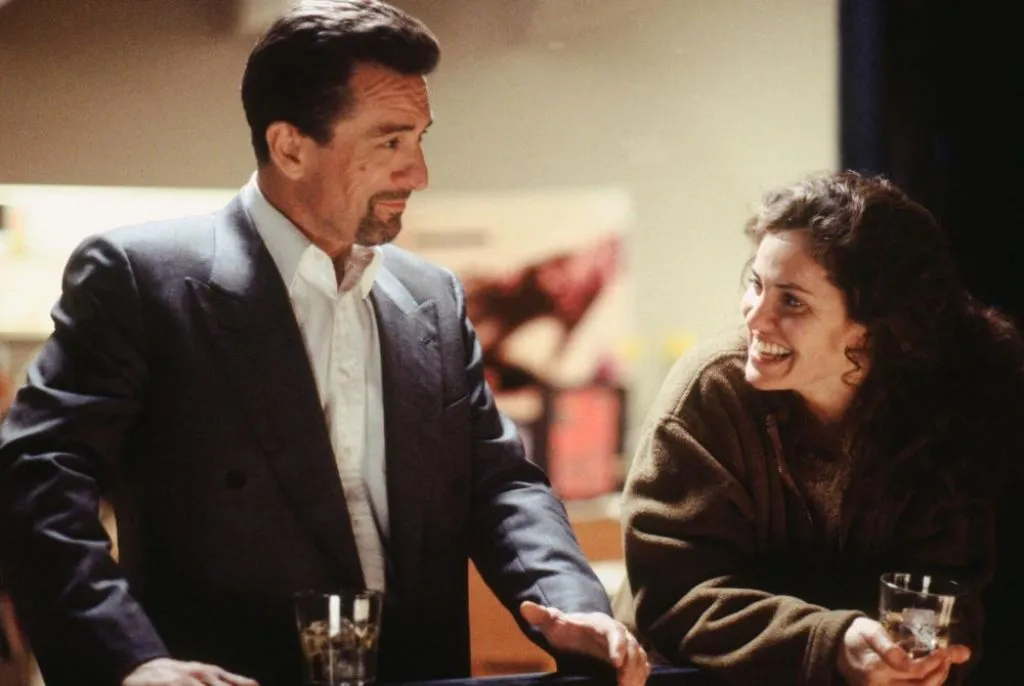Do you love your cause so much that you are ready to die rather than give it up?
The heroes of the film, which will be discussed today, live just like that.
This is not really a movie review. This is a story about loyalty to one's life choice and vocation, whatever it may be. About dedication to their work, professionalism and dedication. The intention to go all the way, knowing that it is deadly.
The film "Heat" directed by Michael Mann. This film is number 2 in my personal TOP of the most favorite films (after "Leaving Las Vegas":
@alekst7/leaving-las-vegas-an-ode)
This is not an ordinary crime thriller, albeit based on real events. This is not just an action game, a clash of good and evil, a struggle between good and bad guys.
This is a drama of human destinies. A story about people who chose the opposite vocation, but equally succeeded in it.
Plot
The film is based on true events - facts from the biography of the criminal Neil McCauley, who was tracked down by detective Chuck Adamson in Chicago in 1964.
Neil McCauley's gang in Los Angeles and the suburbs is committed to daring robberies based on strict discipline and meticulous crime planning. The members of the gang are real professionals, among them there is complete trust and mutual assistance.
The main line of the film is a psychologically tense duel, a confrontation between two personalities with strong colorful characters - the cold-blooded and calculating Neil McCauley (Robert de Niro) and the courageous and selfless police lieutenant Vincent Hanna (Al Pacino).
Vincent Hannah decisively uses all possible and impossible methods to track down criminals and get closer to them. But Neal, careful and attentive, responds with dignity to the challenge.
Both the main characters of the film, for all their originality, are almost mirror-like - both are of the same age, both are obsessed with their work, have colossal experience and a team of professionals.
But they are on opposite sides of the law - one is the best cop, the other is the best robber. One is a hostage to a sense of duty and moral principles. The other is a professional on the dark side of the street, for whom there are no barriers to achieving the goal.
Face to face
It is hard to imagine that two implacable enemies sat and talked peacefully in a cafe, telling each other about family problems and their dreams.
However, this is a real story. In 1963, Charles Adamson was a member of the elite Chicago Police Force and hunted down prominent criminals like the robber Neil McCauley. McCauley was so good that Adamson admired him as a hunter admires a mighty deer. He studied his counterpart closely, and knew that McCauley was also trying to figure out who he was dealing with.
Once they crossed at a shopping center. Both were not "on duty", but their chance meeting could turn into a firefight. However, Adamson did not want to risk the lives of passers-by. So he walked over to McCauley, slapped him on the shoulder, and asked him for a cup of coffee. The taken aback criminal did not object.
Of course, Adamson did it for a reason. He could not interrogate McCauley without an official reason, and hoped that in ordinary conversation he would pull something out of the robber that would help him. McCauley probably thought the same thing. In the work of both, psychology was of great importance, and both were ready for sparring, disguised as a friendly conversation.

But the conversation, too, turned out to be far more intimate than Adamson and McCauley had anticipated.
“ -- I do what I can. And you do what you can - you try to stop people like me, says McCauley.
-- Yes, all my life I have been catching people like you .. this is what it is - replies Hanna.
-- But I can't do anything else.
-- And me too.
-- I don’t want anything.
-- And me too".
They lived on opposite sides of the law. They treated each other with respect, feeling equal in strength and opened their souls to each other.
Although they finally came to the conclusion that they will shoot each other if they intersect during the commission of a crime.
The warnings were prophetic. In real life, their deadly confrontation ended a year after meeting, when Adamson shot and killed McCauley and his boyfriends in a store robbery and after a short chase. Only 15 years later, Adamson remembered this story and Michael Mann.
The cafe meeting scene, which took place at the KATE MANTELINI restaurant in Beverly Hills, was filmed in thirteen takes. "When we did the ninth take, I realized that this was exactly what we needed," Mann recalled.
Personal drama of each
Many in the director's place would have reduced "Skirmish" to a confrontation and an unexpected meeting of the two main characters, but Mann was thinking bigger. He sought to compose a script that humanizes all the defendants. While all crime films clearly delineate good and evil, humanize some and demonize others, Mann wanted to emphasize that every criminal and every police officer is someone's father, husband, brother, or lover. He composed not so much a crime drama as a criminal tragedy.
Mann sought to look as deeply as possible into the hearts of the main characters and reveal in detail not only them, but the characters of their colleagues and loved ones. It was an epic challenge. Therefore, it took years to bring "Grapple" to mind. No wonder Mann has been working on the script for over ten years.
The director perfectly shows the reverse sides of the life of the characters in the film. Indeed, in addition to their main activity, there is also a personal life. But with this, many heroes have problems. And this is perfectly shown in the film.
Vincent Hanna (Al Pacino). He has an adopted daughter, a third marriage, and a wife with whom they no longer understand each other..because he devotes all his time to hunting criminals. "I only exist when I catch someone.. I'm not the one you need, Justin.." - he tells her at the next crisis in their relationship.
Chris Sheeherlis (Val Kilmer) of the Neil Gang is also on thin family ice with his wife Charlene (Ashley Judd) due to losing big bucks at gambling, but he wants to save his marriage at all costs.
Neil McCauley (Robert de Niro). A true professional dedicated to his work. But for the sake of the woman he fell in love with, he decided to change his life, get involved with crime, and go with her to New Zealand, but still remains true to himself and his professional principle: "Do not have anything that holds you back, with which you could not part within 30 seconds if you feel chased."

Remaining always true to his code of honor, Neal could not refuse the obligatory revenge, which became fatal for him.
But director Michael Mann hoped that the audience, when they left the theater hall, would not be happy that the villain was shot, but regret that human destinies develop in such a way that men who could be friends fight and kill.
Of course, this is their fate. And for some, it can be cruel.
Because being yourself is paying the price
The willingness to take risks and pay the price unites the protagonists. Sometimes you have to sacrifice something for your goal.
Not everyone knows their true calling. Many have been looking for it all their lives. But the one who chooses exactly who is in it must go to the end in order to realize what is invested in it. Believe with all your soul in what you are doing, and find the same desperate like-minded people.
After all, everyone should do the business for which he was created.
Love what you do.
And it won't always be easy. Sometimes it's hard work. It is not comfortable. It's tiring and exhausting
“But a certain moment comes when, in general, it does not matter who and what thinks of you, when your activity becomes simply your existence. And it’s you, and even if you’re wrong, it’s still you, this is your life, unlike anyone else. "(Joseph Brodsky, interview "Staying by yourself..")
